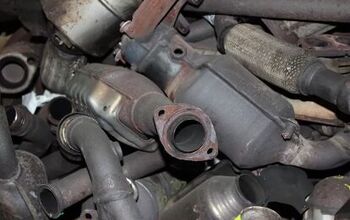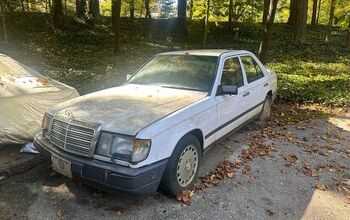OICA President Walks Back Criticism Of US Auto Industry
A week ago the president of OICA, Patrick Blain, ruffled some feathers on this side of the Atlantic by laying into the US auto industry with such bon mots as
If the American manufacturers had gone years ago to the government and said, ‘Listen, we have a huge project’ – electric cars, for instance, the government could at least have studied it. But they never tried.
Take the Chevrolet Volt (extended-range electric vehicle launched in 2010). Without government help, at least in the developmental stages in which certain economies of scale must be reached, it is too expensive. It’s just another example of the American industry being too late. They have missed many trends.
Because the sign of an innovative automaker is entanglement with the government… just ask Blain’s compatriots (and former colleagues) at Renault! Oh, and incidentally, Detroit did approach the government for help developing green cars back in the 1990s and managed to waste a cool billion dollars building three prototypes (see: PNGV). But there I go taking Blain at his word… when he’s already walking back his nonsensical comments.
Wards Auto was kind enough to give Monsieur Blain the opportunity to mitigate his unnecessarily inflammatory comments. Unsurprisingly, however, Blain’s walk-back is just as incomprehensible as his initial comments:
In a new auto world, with so many different power technologies (electric, hybrid, classical) things are getting more and more complex, and we must understand each auto world.
Every government, every nation has its own automotive culture. What I wanted to highlight is that manufacturers, with different technologies, gas prices, taxes, government incentives are all reducing, in a drastic way, (carbon-dioxide) emissions. That is definitely not what I explained. Some started sooner, some later, but they drive all in the same direction.
Apparently Blain’s volte-face came after the Alliance of Automobile Manufacturers, which represents American-based automakers, entered “discussions” with Blain. Apparently it wasn’t hard to convince Blain that he was talking nonsense, but it seems to have been much more difficult to get him to actually start making sense. Meanwhile, Americans are now free to continue ignoring OICA as they have for decades.
More by Edward Niedermeyer
Latest Car Reviews
Read moreLatest Product Reviews
Read moreRecent Comments
- ToolGuy First picture: I realize that opinions vary on the height of modern trucks, but that entry door on the building is 80 inches tall and hits just below the headlights. Does anyone really believe this is reasonable?Second picture: I do not believe that is a good parking spot to be able to access the bed storage. More specifically, how do you plan to unload topsoil with the truck parked like that? Maybe you kids are taller than me.
- ToolGuy The other day I attempted to check the engine oil in one of my old embarrassing vehicles and I guess the red shop towel I used wasn't genuine Snap-on (lots of counterfeits floating around) plus my driveway isn't completely level and long story short, the engine seized 3 minutes later.No more used cars for me, and nothing but dealer service from here on in (the journalists were right).
- Doughboy Wow, Merc knocks it out of the park with their naming convention… again. /s
- Doughboy I’ve seen car bras before, but never car beards. ZZ Top would be proud.
- Bkojote Allright, actual person who knows trucks here, the article gets it a bit wrong.First off, the Maverick is not at all comparable to a Tacoma just because they're both Hybrids. Or lemme be blunt, the butch-est non-hybrid Maverick Tremor is suitable for 2/10 difficulty trails, a Trailhunter is for about 5/10 or maybe 6/10, just about the upper end of any stock vehicle you're buying from the factory. Aside from a Sasquatch Bronco or Rubicon Jeep Wrangler you're looking at something you're towing back if you want more capability (or perhaps something you /wish/ you were towing back.)Now, where the real world difference should play out is on the trail, where a lot of low speed crawling usually saps efficiency, especially when loaded to the gills. Real world MPG from a 4Runner is about 12-13mpg, So if this loaded-with-overlander-catalog Trailhunter is still pulling in the 20's - or even 18-19, that's a massive improvement.

































Comments
Join the conversation
Don't forget, OICA was founded in Paris as a mostly European organization and it's still based in Paris. He speaks like a French diplomat, talking in circles. French diplomats somehow have amazing success arriving at incomprehensible agreements that everyone signs off on, so Blain can be forgiven for wanting to emulate them. Re: his "years ago..." comment, he's obviously unaware of the American style of governance. He should look closely at the national clean air effort in the 1970s, when automakers weren't allowed to "collude" with each other for that common goal. The result was a different smog system for every manufacturer, and a headache for car owners and mechanics alike. That's not how standards are developed in Europe.
What missed trends? With Volt (and EV-1 before that) America is at least as good as any other auto-producing continents as far as electric vehicle is concerned. Sure the Japanese were more successful in their Prius as far as sales are concerned, but technology wise? There are no countries in which the EV has become commonplace, with infrastructures in place, so they're still in its infancy, just like they're in the U.S. Certainly not France. Anyway, I think these whole movements into electric vehicle is a tad premature. Most electricity is still generated through traditional, polluting method, using non-renewable fuel. If electricity use skyrocket due to popularity of EVs, how's that going to help the environment or conserve non-renewable energy sources? Not to mention the electricity grid might not be able to cope with the increased usage. If we had found a way to cheaply generate electricity through non-polluting means, fusion power, solar, etc. then it would make sense to start converting our transportation tool to electric.